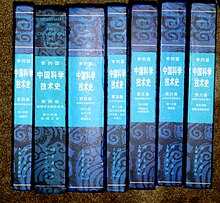
Back Science and Civilisation in China German علم و تمدن در چین Persian Science and Civilisation in China Hungarian Ciência e Civilização na China Portuguese 中国科学技术史 (李约瑟) Chinese
 Science and Civilisation in China (Chinese translation) | |
| Author | Joseph Needham |
|---|---|
| Original title | Science and Civilisation in China |
Science and Civilisation in China (1954–present) is an ongoing series of books about the history of science and technology in China published by Cambridge University Press. It was initiated and edited by British historian Joseph Needham (1900–1995). Needham was a well-respected scientist before undertaking this encyclopedia and was even responsible for the "S" in UNESCO.[1] To date there have been seven volumes in twenty-seven books. The series was on the Modern Library Board's 100 Best Nonfiction books of the 20th century.[2] Needham's work was the first of its kind to praise Chinese scientific contributions and provide their history and connection to global knowledge in contrast to eurocentric historiography.[3]
By asking his grand questions: why did modern science not develop in China, and why China was technologically superior to the West prior to the 16th century, Needham’s Science and Civilisation in China is also recognized as one of the most influential works in stimulating the discourse on the multicultural roots of modern science.
In 1954, Needham—along with an international team of collaborators—initiated the project to study the science, technology, and civilisation of ancient China. This project produced a series of volumes published by Cambridge University Press. The project is still continuing under the guidance of the Publications Board of the Needham Research Institute (NRI), chaired by Christopher Cullen.[4]
Volume 3 of the encyclopedia was the first body of work to describe Chinese improvements to cartography, geology, seismology and mineralogy. It also includes descriptions of nautical technology, sailing charts, and wheel-maps.[5]
Needham's transliteration of Chinese characters uses the Wade-Giles system, though the aspirate apostrophe (e.g., ch'i) was rendered 'h' (viz. chhi; traditional Chinese: 氣; Mandarin Pinyin: qì). However, it was abandoned in favor of the pinyin system by the NRI board in April 2004, with Volume 5, Part 11 becoming the first to use the new system.[6]
- ^ Boston, Richard (20 June 1971). "Joseph Needham, the Real Thing". The New York Times. Retrieved 27 July 2018.
- ^ Modern Library, 1999. 100 Best Nonfiction."
- ^ Jacobsen, Stefan Gaarsmand (2013). "Chinese Influences or Images?: Fluctuating Histories of How Enlightenment Europe Read China". Journal of World History. 24 (3): 623–660. doi:10.1353/jwh.2013.0076. ISSN 1527-8050. S2CID 143538155.
- ^ "Science and Civilisation in China". Needham Research Institute. Retrieved 9 July 2008.
- ^ Needham, Joseph. Science and civilisation in China. Wang, Ling, 1917-1994., Métailie, Georges., Huang, H. T. Cambridge [England]. ISBN 978-0521057998. OCLC 779676.
- ^ volume 5, part 11, page xxxii
© MMXXIII Rich X Search. We shall prevail. All rights reserved. Rich X Search